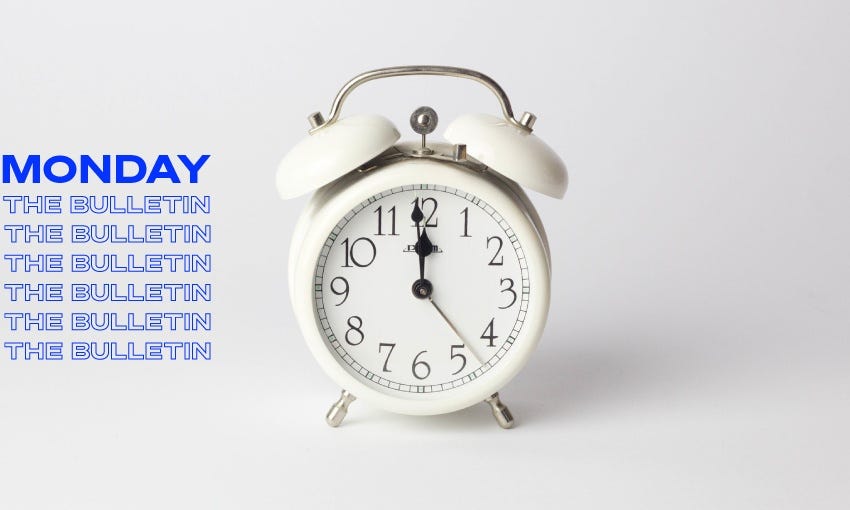The argument over daylight saving
Spring Ahead? Fall Back? Do nothing? Parliament shows little enthusiasm to stop changing the clocks
Mōrena and welcome to The Bulletin for Monday, April 4, by Justin Giovannetti. Presented in partnership with Z Energy.
In today’s edition: A possible move to orange; crowded field for Auckland mayor; the abuse faced by female leaders; but first, the debate over changing the clocks.
Should we follow the US senate and stop the change. (Image: Flickr / Jernej Furman)
Welcome to brighter mornings and darker evenings.
Yesterday morning my dog politely barked to let us know that he’d very much like to get going. I looked at the clock and it was unusually early for him to make a fuss. Except it wasn’t. Daylight saving had ended and while millions of New Zealanders were enjoying a sleep-in, my dog wasn’t one of them. Parents of young children had it much worse. The disruptive impacts of the twice-yearly ritual of changing our clocks are well documented, associated with a number of negative effects on our health and public safety. Chris Schulz, passionate hater of daylight saving, shares his thoughts in The Spinoff. “Across my 43 years, I have experienced daylight saving 85 times and I have never gotten used to it, understood it, worked out why it exists, or who it is for,” he writes.
The perennial debate on changing the clocks continues.
After the US senate unexpectedly voted to make daylight saving time permanent from 2023, the debate over changing the clocks has had a little more urgency. While sometimes seen as a quixotic preoccupation, there’s some merit around the change. For starters, as the Sunday Star-Times reports, daylight saving is increasingly unfashionable around the world. Apart from Europe and North America, most countries have dumped changing the clocks. With the EU and US considering abolishing it, New Zealand could find itself in a small club with Cuba, Syria and Iran (as well as a few others). One small slice of Aotearoa stays, unofficially, in daylight saving year-round. 1News reports on the ongoing fight for Te Anau Time.
What are the arguments against this?
The idea that moving a single hour on the clock could significantly disrupt individuals, and an entire society, might seem farfetched to some. A study from the University of Auckland shows there will likely be 12% more traffic accidents today. A lot of experts think keeping daylight saving is a good idea. However, within the camp of those who want to stop adjusting clocks, there’s also a split. Some want year-round standard time. Neurologist Jocelyn Cheng told Breakfast about the risks of messing with the circadian rhythm and why she favours the second option. The US senate’s sunshine protection act would make daylight saving permanent. A number of Canadian provinces have similar bills ready.
No sign New Zealand wants to join the ban-wagon.
According to the Dominion Post, there’s tepid enthusiasm here to change the way things are. The national mood is described as: if it ain’t broke, don’t fix. Dairy farmers aren’t all that keen on a change, restaurants like the sunset views and educators can see the benefits of the current system. Most of Aotearoa’s political leaders just don’t want to get involved in the debate. Without a sponsor at parliament, it's unlikely to go anywhere. The Washington Post looks at the ongoing debate and gives New Zealand postie George Hudson a shout for gifting us/dooming us to daylight saving.
We need your help! The Spinoff's independent, homegrown journalism is only possible because of our members.As we struggle against the continued erosion of the media business by big tech platforms and now the commercial uncertainty brought on by the pandemic, reader support is critical.
If you can, support independent media today by becoming a member.
A move to orange this week?
Cabinet will be reviewing the country’s Covid settings today as the omicron wave subsides across much of Aotearoa. Derek Cheng reports in the NZ Herald (paywalled) that cases in Auckland have likely fallen to their new baseline. There are now 16,000 active cases across the city and about 15% of hospital beds in the three DHBs are occupied by Covid cases. That’s the new normal. Another rule is ending today, with vaccine passes no longer required from midnight. The ministry of health has asked people to keep tabs on their health, even if they aren’t scanning, according to Newshub.
Eight candidates for Auckland mayor, including Austin Powers impersonator.
With a late entry into the race there are now seven men, two with the last name of Brown, and one woman running to replace Phil Goff. The Spinoff’s live updates reports that the newest candidate is Gary Brown. The chair of the Hibiscus and Bays local board, Brown joins a crowded field with Viv Beck, Wayne Brown, Efeso Collins, Ted Johnston, Jake Law, Craig Lord and Leo Molloy. Gary Brown might be better known as the only legally authorised Austin Powers impersonator in the world. Alex Casey spoke with Brown for The Spinoff several years ago, in a story worth revisiting.
Ending the abuse faced by women in politics.
The Dominion Post’s front page didn’t shield readers from the growing nastiness women face in politics, using an uncensored c-word in its lead paragraph. The story looked at the toxic abuse female leaders face, from council to the prime minister. I’ve been lucky to cover a number of female premiers and senior leaders throughout my journalism career and the abuse they face is truly horrible. RNZ looked at the story and the media’s role in spreading hateful messages.
From our friends at Z: A lot has changed in New Zealand in the last ten years. So, when a company sets a brand tagline of “Z is for New Zealand” in 2011 and still uses it today, it’s important they keep growing, to ensure that still holds true a decade on.
At Z, they know they have to innovate and make changes that positively impact the environment. From creating Sharetank, a virtual fuel tank that offers customers another way to pay, to installing EV chargers at service stations, they’re dedicated to providing New Zealanders with better ways to get moving.
To find out more about how Z is working to move from being a part of the climate change problem to the heart of its solution, check out their website. (Sponsored)
Government funds drones that can melt fog.
Hundreds of flights into the capital were cancelled last week after a thick fog bank settled on Wellington and stayed for two days. The government wants to banish fog to history. RNZ reports that Christchurch-based company Pyper Vision is developing a spray that can absorb moisture from the air, clearing fog. A drone can absorb a patch of fog in as little as 10 minutes, the company claims.
Ukrainian forces free areas around Kyiv, find civilian mass graves.
The Russian army has retreated from its positions near Ukraine’s capital, leaving behind 30 shattered towns and villages. Reuters reports that 300 residents were killed during the Russian occupation of one town, with bodies left on the streets and in mass graves. Journalists following the troops found a still-open mass grave at a church ground. Ukraine’s president claimed that soldiers also found bodies booby trapped with mines. There’s a growing call for the International Criminal Court to investigate possible war crimes by Russia.
Got some feedback about The Bulletin, or anything in the news? Get in touch with me at thebulletin@thespinoff.co.nz
Toby Manhire looks at calls to overhaul the .nz system after inaction over a “Nuremberg” website. Chris Schulz gives a brief history of the worst office bathrooms he has endured. Tara Ward ranks the celebrity contestants for 2022’s Dancing with the Stars. Fiona Kidman writes about her love for literary festivals. The Spinoff staff gives you a light moment with the first virtual pet day.
Paul Coll defends squash title at British Open.
Coll, the world’s top ranked male squash player, dominated his final opponent and won every set he played in the British Open. RNZ reports that a loss by the New Zealander to Egyptian rival Ali Farag would have kicked Coll out of the top spot. Instead Coll, 29, was described as having accurate and stingy play that overwhelmed his opponents.











